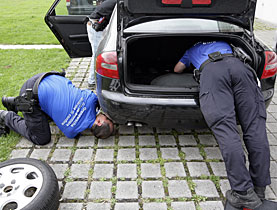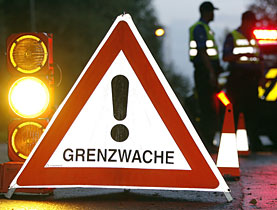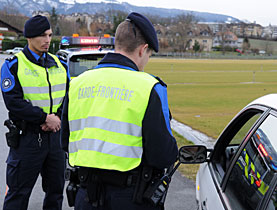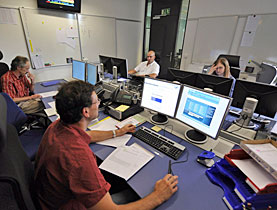Schengen is no major upset for border guards

Don't expect many big changes when Switzerland dismantles its terrestrial borders to join Europe's Schengen zone on December 12, say the Swiss border guards.
While land borders will no longer have passport control points, goods traffic will still be subject to regular customs searches. And checks at airports in Switzerland – which is not a European Union member – are likely to be lifted only next March.
EU interior ministers meeting in Brussels last week unanimously approved the treaty with Switzerland that enters into force next Friday.
From that date, systematic checks on individuals will be abolished and cooperation will be increased in the fight against cross-border crime.
But as Switzerland is not a member of the EU’s customs union, Swiss border guards will still carry out customs controls for illegal goods, weapons or other items.
To help avoid potential confusion on the ground, the Swiss border guards on Monday presented their new Schengen public information programme to the press.
“Schengen means no more systematic controls at internal Swiss borders. However customs controls will remain and so people crossing internal borders will not notice very much about the changes,” Michaela Rickenbacher, Swiss border guards’ chief of staff, told swissinfo.
“Most traffic can drive through without problems but it’s still possible to select certain cars and carry out checks on goods and individuals,” she said.
While terrestrial borders are dismantled on December 12, air transport in the Schengen zone will still be subject to passport controls until the new flight timetables are introduced at the end of March 2009.
Joining Schengen also means tightening up external Schengen borders. Swiss border guards are therefore being redeployed to replace international police officers at Swiss airports to carry out controls on passengers crossing external Schengen borders.
Another important change on December 12 involves visas. Foreigners from third countries residing in Switzerland will no longer require a Schengen visa to enter the Schengen zone. And tourists from outside the EU travelling to Europe can also visit Switzerland if they obtain a Schengen visa.
Less work?
For Swiss border guards Schengen will mean greater emphasis on customs, but they will continue to carry out police work delegated by cantons and, where police suspicions are roused, an ID check will still be possible.
So Schengen won’t necessarily mean less work for Swiss border guards.
“Apart from customs checks, we’ll also have mobile team controls inside the borders,” said Rickenbacher, adding that a number of mixed mobile patrols are also being created with border guards from neighbouring countries.
On Monday the Swiss border guards inaugurated a new mobile unit in northern Geneva where suspicious vehicles and individuals can be taken for further checks.
According to the Swiss authorities, Schengen provides a clear and practical legal basis for the police and border guards to strengthen cross-border cooperation with the other 27 countries that belong to the border-free zone.
Increased security
One of the main tools to help fight cross-border crime is the Schengen Information System (SIS), a data bank used by all countries with information on wanted persons and stolen goods.
Since the SIS database was introduced on August 14, Swiss authorities have queried it about 130,000 times a day. That yields on average about 30 hits.
In total there have been more than 2,000 hits since August, mostly in canton Zurich, Ticino, Basel City, St Gallen and Geneva.
Of those hits, the SIS has found 25 people wanted by another European country in connection with serious crimes. About 900 hits have been for people who have been denied entry into the Schengen area, while another 500 hits have been for missing persons.
“It allows us to have an international network to find out the real criminals… and helps to make human checks more efficient,” said Rickenbacher.
swissinfo, Simon Bradley
The Schengen Area comprises 24 countries, most of which are members of the EU, as well as the four member countries of the European Free Trade Association – Iceland, Norway, Switzerland and Liechtenstein.
The Schengen treaty takes its name from a town in Luxembourg where it was signed by Germany, France and the Benelux states in 1985.
International cooperation in the context of the agreement facilitates travel for individuals by eliminating systematic checks at common borders of signatory states.
At the same time, new measures have improved international cooperation between justice and police authorities to combat crime. These include security steps and tighter controls at external Schengen borders and greater cross-border police cooperation using the Schengen Information System (SIS).
Switzerland signed the Schengen accord on October 26, 2004. Swiss voters approved it on June 5, 2005 with 54.6% in favour. Evaluation of application of Schengen applications in Switzerland covers the following areas: police cooperation, SIS, data protection, securing the outer borders of Schengen (at airports) and cooperation with regard to visas.
The Swiss border guards are the armed service of the federal customs administration, a department of the finance ministry.
There are approximately 2,000 border guards, including 100 women. They work at 91 fixed locations and in 35 mobile units along Switzerland’s 1,881 kilometres of borders.
Their main tasks are fighting illegal immigration, cross-border crime and contraband, but they also deal with counterfeiting and the smuggling of weapons, plants and animals.
Swiss border guards hand over around 30,000 suspects annually to the respective police force. They also uncover some 4,000 cases of cross-border smuggling, 2,000 document forgeries and 30,000 road traffic offences.

In compliance with the JTI standards
More: SWI swissinfo.ch certified by the Journalism Trust Initiative




You can find an overview of ongoing debates with our journalists here. Please join us!
If you want to start a conversation about a topic raised in this article or want to report factual errors, email us at english@swissinfo.ch.